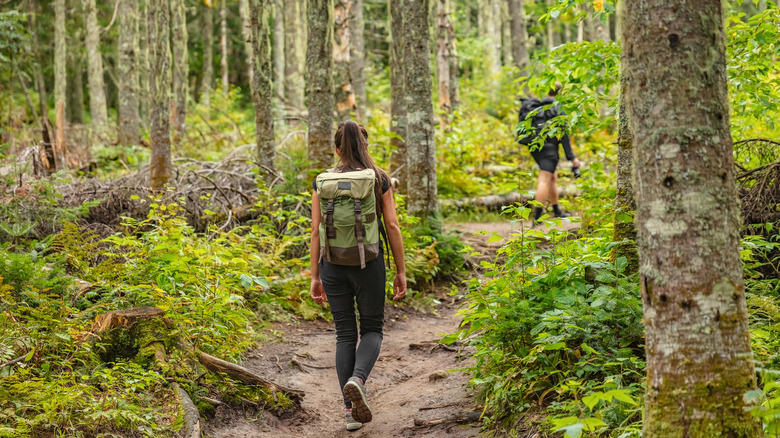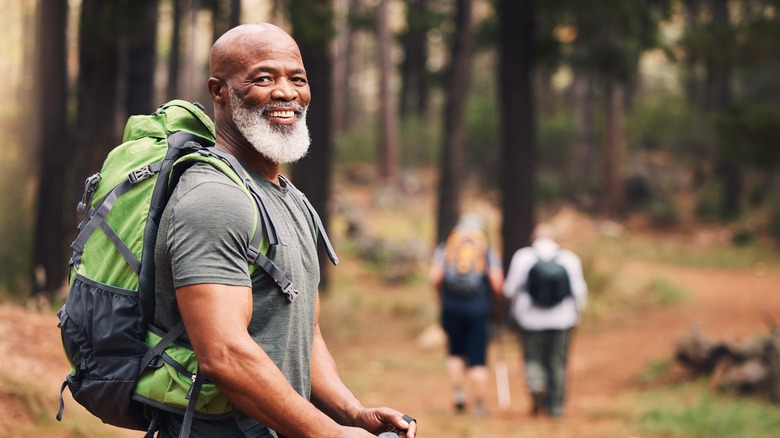Travel Guides Outdoor Adventures Hiking
Lexi Kassler
Yes, the title says we’re settling the debate on whether you should say hello to fellow hikers, but is there really a debate to be had? We strongly believe that unspoken trail etiquette dictates that you should greet your fellow hikers. Now, you’re not a terrible person if you don’t. Hikers will understand if you’re too out of breath or too tired to eke out a hello. However, when passing in opposite directions, it’s just polite to acknowledge each other’s existence. It’s not all about politeness, though. It can also be a matter of safety.
When approaching hikers from behind, you should make your presence known so you don’t surprise them. While you might think you’re not being all that quiet as you tromp along the trail, a lone hiker may be lost in their thoughts and not hear you coming.
If you’re a bit shy, don’t be. Smile and wave anyway. Everyone on the trail is out doing the same thing as you — enjoying nature and the surrounding scenery. While you might run into the rare curmudgeon, just remember that if they don’t smile or wave back, that’s their prerogative.
Help solo hikers feel safe on trails

Mapodile/Getty Images
It should come as no surprise that not everyone feels equally safe when hiking solo. Women, the disabled, members of the LGBTQ+ community, people of color, and the elderly can often be targets of violent criminals looking for trouble on hiking trails. As a result, it can be intimidating to venture out on their own.
So, what can you do to make solitary hikers feel safe? You already know how we feel about saying hello and making your presence known — it’s a must. But when it comes to approaching a solo hiker (either from ahead or behind), even a small bit of effort can help them feel safe.
If passing them, give a friendly hello and a smile and pass them swiftly. Unless you have a good reason or they engage you first, leave the small talk for the grocery store checkout lane and don’t engage in conversation. Besides the safety and comfort factor, some people are just out to enjoy nature and don’t want to chat.
If approaching a solo hiker from behind, don’t speed up to pass them, as this can be alarming. Either slow down or stop for a while to give each other some room and continue on your way. If they’re walking slower than you, consider giving a friendly hello once you’re close and asking if they would mind if you passed them.
Other trail etiquette tips you won’t want to forget

Maridav/Shutterstock
If you’re a hiking newbie, the unwritten trail etiquette doesn’t stop at waving hello to your fellow hiker. Once you get some miles under your belt and run into someone not following these unspoken rules, you’ll understand.
Our first bit of trail etiquette for you also falls in line with the “leave no trace” principle — stay on the trail. Going off the trail can be dangerous, since it can be easy to get lost and can lead to erosion and disruption of local ecosystems, which is pretty disrespectful to both nature and those who maintain the trails.
Now you know to stay on the trail, but here are a few good reasons to stop and step off to the side. If a group that is smaller than yours or going faster than yours comes up behind you, step aside and let them pass. You don’t want them trailing behind you, and they don’t want to be stuck behind you either. You’ll also want to yield to hikers coming uphill toward you unless they indicate otherwise. They may be waiting to catch their breath anyway.
Finally, if you need to stop, don’t break out the trail mix while standing in the middle of the path. Find an area a few feet off the trail where it would be appropriate to stop and take a rest. And be sure to leave nothing behind.

